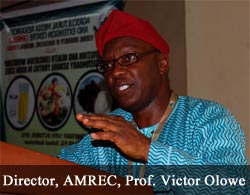
Nutrition and Health experts have called on Nigerians to always eat diverse, balanced and moderate food, to stay healthy and live long. The call was made during a workshop on Nutrition and Health Education for Secondary School Youths, organised by the Gender Issues and Youth Development Programme (GIYD), Agricultural Media Resources and Extension Centre (AMREC) of the University.
Speaking on the topic, “Youth and Nutrition”, Dr. Catherine Oladoyinbo of the University, said the nutritional status of a person should be balanced through the consumption of diverse food in addition to embarking on regular physical exercises. The Nutrition and Dietetics Don advised consumers of food to always endeavour to carefully read labels attached to foods being purchased, adding that eating good food was not only about its high cost but eating the right combination. While submitting that money alone does not determine good and adequate nutrition, Dr. Oladoyinbo enjoined all to always eat plenty of fruits, vegetables, fibre foods and also drink between six and eight liters of water, daily.

In her presentation titled, “Youth, Nutrition and Health”, the Director, Students’ Industrial Work Experience Scheme (SIWES), Professor Grace Sokoya, defined the state of health of an individual as the “complete physical, mental, social and spiritual well-being and not the absence of disease and infirmity”. She said eating diverse and balanced diet would promote well-being by improving mood, energy, self-esteem, boost concentration and performance by reducing the risk of ill-health and increase productivity. Professor Sokoya stated that there was no perfect diet per se but people should rather avoid consuming processed food, as unprocessed food remained the safest for human consumption.
The Director of AMREC, Professor Victor Olowe, congratulated the participants for the opportunity they had in attending such a workshop at an early stage of their lives. Professor Olowe said it was true to say that, “we are what we eat”. Hence, for a nation like Nigeria to be disease-free, the nutrition of its citizens should be considered a priority.

“For a great nation like Nigeria to be disease-free, the nutrition of her citizens should be considered because a nation where her populace is poorly fed will not be productive, since most of the resources that could have been used for community development would be spent on disease treatment that could have resulted from malnutrition”, he added. The Director advocated for adequate sensitisation and capacity building on the efficient use of available food appropriately, as participants were taken through practical sessions on the production of “4-Alive Fruit Juice” and “Fruit Salad”.
Participating secondary schools at the workshop include: FUNAAB International School (FUNIS); Asero High School, Asero; Salawu Abiola Comprehensive High School, Osiele; Nawair-U-Deen Grammar School, Obantoko; Egba Comprehensive High School, Asero and Omolaja Sodipo Memorial Anglican School, Onikolobo; all in Abeokuta, Ogun State.
